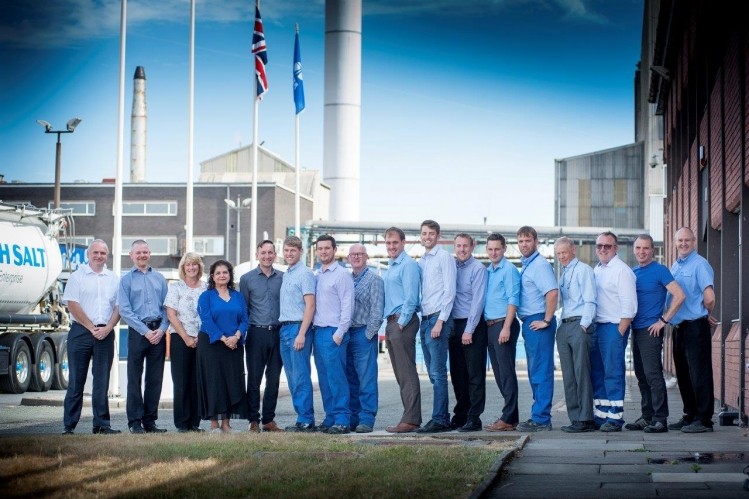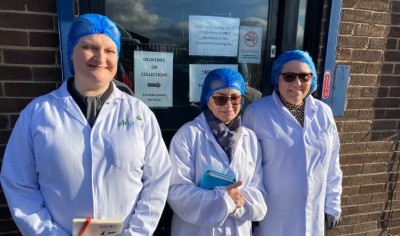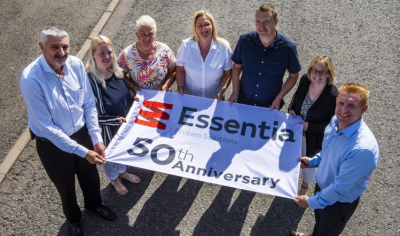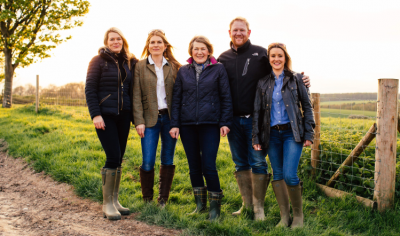ME AND MY TEAM
British Salt: pure approach pays off

From this site in the heart of Cheshire, we produce around 1,000t of salt daily for industries such as chemicals and textiles, and for food manufacturing, food retailers and foodservice customers.
It can be easy to think of salt as a simple commodity, but it has more than 14,000 known applications, including water softening, animal feed, tanning, de-icing and, of course, food flavouring.
British Salt was bought by Tata Chemicals Europe (TCE) in 2010, and it has invested substantially in the site. This includes the ongoing installation of a £7.2m energy efficient boiler plant – the largest single investment in the company since it was founded 50 years ago. It will save us more than £600,000 a year in gas supply costs.
Other recent projects include the commissioning of our first new brinehole in more than five years, and the replacement of one of our evaporation plant heat exchangers. In total, TCE has invested £25m in British Salt since 2015.
I joined the company in 2016, taking on responsibility for this site, which makes salt [sodium chloride], as well as the sodium bicarbonate plant near Northwich.
TCE also operates a soda ash [sodium carbonate] plant on the other side of Northwich. The three plants combined make 1mt of product every year.
Purity important for food
What makes Cheshire salt attractive is the purity level we can get it to – important for food. That said, salt is a fickle ingredient to get out of the ground. Our method involves drilling a small pipe into the strata and pumping water in, saturating it into brine.
Located 5km away, our brinefields provide us with several hundred years’ worth of reserves. We currently have mineral rights for more than 100 years.
Once the brine is pumped to the main plant, it goes through a three-stage purification process, where the magnesium, calcium, and then sulphate is removed.
Lime and soda ash are added to the brine. They act as a flocculant, binding the impurities together, so they become heavy enough to be removed. The impurities then get pumped back down into old brineholes.
The purity we can achieve ranges from 99.7% to 99.9%, which isn’t possible with sea salt. Ours is free of micro-plastic as well. Once purified, the brine enters six evaporation vessels.
The brine is boiled under vacuum – which allows you to boil at a lower temperature as it is more efficient – and then put through a centrifuge. By this time, the undried vacuum salt is down to 3% moisture, and it looks a bit like snow.
The salt is then mixed with hot air inside fluidised dryers. The smallest salt crystals are extracted from the air in the dryers and transferred to the compaction plant to be used in water softeners. The remaining dried salt is then graded through a series of scalping screens, which separate the salt crystals based on their particle size.
The separation process forms the Fine 50, Fine 60, Tanker Fine and Tanker Coarse products, while the remaining crystals are packaged as Pure Dried Vacuum (PDV) salt.
Matching the peaks and troughs
Apart from a couple of planned maintenance shutdowns a year, we run 24/7. While it’s a very reliable operation, our challenge is always making enough and matching the peaks and troughs in demand.
About a quarter of what we produce goes into food production and, like the rest of the industry, we experience increased demand in the run-up to Christmas.
But it’s what makes our lives interesting. Because we put out such a large volume, there are literally hundreds of vehicle movements a day.
While we’ve reached near saturation point in the UK, our export markets continue to grow. We export to more than 50 countries, including places like Peru and Suriname. Again, that’s down to the purity and quality of what we can produce.
There’s also growth coming from different – and typically, smaller – packaging formats. We can supply 12.5kg bags all the way up to 1t flexible intermediate bulk containers and bulk tankers.
To keep up with this growth, we recently installed a 1,500 bags per hour (bph) automated weighing, bagging and palletising line from Concetti – outstripping our previous line, which ran at 400bph. A second one will be installed in a few months.
But it isn’t all about the equipment. My time at my former employer, oil field services firm Baker Hughes, taught me the importance of investing in safety. We focus on the three ‘p’s – plant, process and people.
Of course, it’s important to set realistic expectations, but the only safety standard you should expect with each is perfection.
Safety can be a strange thing– there is no reward for staff in achieving perfection, so the trick is to give them positive reinforcement when they do things right. That can be given directly to the individual or shared among the workforce – but it has to be sincere and timely.
By doing that, engagement scores go up. And when that happens, quality goes up, safety goes up, and production improves. It’s a virtuous circle, and quickly becomes the obvious thing to do.
British Salt
Location: Cledford Lane, Middlewich, Cheshire, CW10 0JP
Factory size: 68,800m2
Turnover: £38m
Factory staff: 120
Main products: Standard PDV, Fine 50, Fine 60, Tanker Fine, Corse Salt, Iodised Salt, own-label, bespoke products.
Packing lines: Seven, including two high-speed food-grade lines.
Factory output: 1,000t a day.
Stephen Crabb: “When I’m not thinking about work, I like to get out and about in my campervan. It’s a 1979 Volkswagen Type 2, so I don’t go very far with it!”















